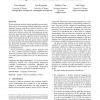177 search results - page 6 / 36 » The garbage collection advantage: improving program locality |
CORR
2011
Springer
12 years 11 months ago
2011
Springer
Modern high-end machines feature multiple processor packages, each of which contains multiple independent cores and integrated memory controllers connected directly to dedicated p...
ASPLOS
2004
ACM
14 years 26 days ago
2004
ACM
Tracing garbage collectors traverse references from live program variables, transitively tracing out the closure of live objects. Memory accesses incurred during tracing are essen...
USENIX
2008
13 years 9 months ago
2008
Continuous memory leaks severely hurt program performance and software availability for garbage-collected programs. This paper presents a safe method, called LeakSurvivor, to tole...
ECOOP
2001
Springer
13 years 12 months ago
2001
Springer
Abstract. The effectiveness of garbage collectors and leak detectors in identifying dead objects depends on the “accuracy” of their reachability traversal. Accuracy has two ort...
CC
2007
Springer
14 years 1 months ago
2007
Springer
Reference counting is a classical garbage collection method. Recently, a series of papers have extended the basic method to drastically reduce its notorious overhead and extend the...

